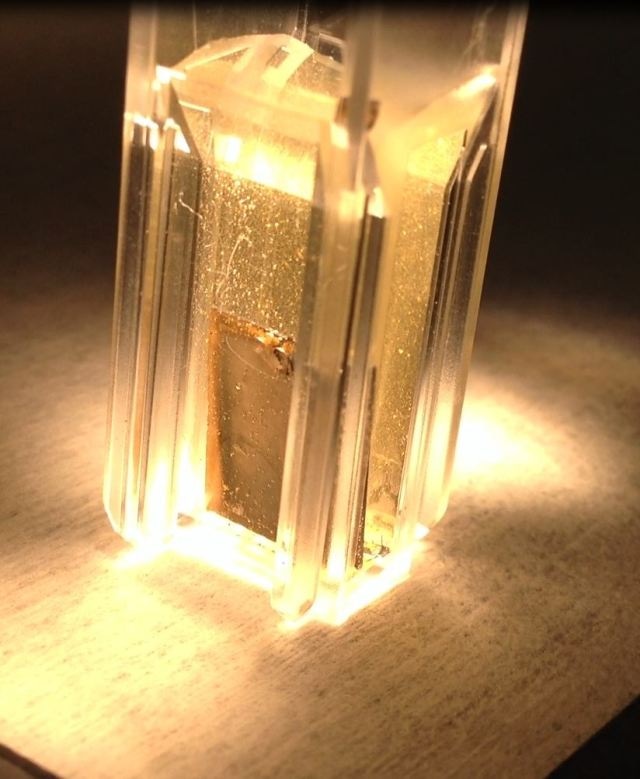Jun 17 2016
Researchers from the University of Iowa (UI) are collaborating with HyperSolar, a startup company based in California, to produce clean energy from water and sunlight. Recently, the university renewed its one-year research agreement with HyperSolar, a company focused on commercializing low-cost renewable hydrogen, to advance the development of the new technology.
 UI researchers have developed a small solar-powered electrochemical device that can help make energy using sunlight and water. Photo courtesy of Syed Mubeen.
UI researchers have developed a small solar-powered electrochemical device that can help make energy using sunlight and water. Photo courtesy of Syed Mubeen.
Hydrogen power is possibly one of the greenest and cleanest energy sources available today, because when it generates energy the final result is water rather than carbon emissions. It can also be deposited in a fuel cell to turn it into more reliable solar cells or solar panels that require regular sunlight to stay “on”.
Syed Mubeen, a lead scientist at HyperSolar and a chemical engineering professor at the UI, said that although hydrogen is present in large amounts on the Earth, the level of pure hydrogen present in the atmosphere is very low (around 0.00005%), so it has to be artificially produced.
At present, a large amount of hydrogen power is being produced from fossil fuels using a chemical process known as steam reforming that releases carbon dioxide. Although the end result is hydrogen, the process makes it less sustainable and eco-friendly. Hydrogen can also be produced using electrolysis, a technique that needs highly distilled water and electricity in order to break down water molecules into hydrogen and oxygen. Even though this is a sustainable method (presuming that the electricity is generated from a renewable energy source) the material costs linked to the system are expensive and it becomes a major obstacle for the production of affordable renewable hydrogen.
Developing clean energy systems is a goal worldwide. Currently, we understand how clean energy systems such as solar cells, wind turbines, et cetera, work at a high level of sophistication. The real challenge going forward is to develop inexpensive clean energy systems that can be cost competitive to fossil fuel systems and be adopted globally and not just in the developed countries.
Syed Mubeen, Lead Scientist, HyperSolar
HyperSolar’s Mubeen and his collaborators from the UI’s Optical Science and Technology Center are devising a more eco-friendly and cost-effective method to produce hydrogen, taking inspiration from plants. So far, the scientists have developed a small electrochemical device, powered by solar energy. This device can be used in different types of water, including wastewater and seawater. When sunlight flows through the water and reaches the solar device, the photon energy from sunlight changes the water (a lower energy state) into hydrogen (a higher energy state), where it is stored similar to a battery. Later, when the hydrogen is changed back into water, the energy is produced. This resembles what plants do utilize photosynthesis.
Mubeen’s team are now working to reduce costs and make the process more strong so that it can be created on a larger scale. In this way, it could be utilized to power hydrogen fuel cell vehicles or used as renewable electricity.
Although H2 can be used in many forms, the immediate possibility of this renewable H2 would be for use in fuel cells to generate electricity or react with CO2 to form liquid fuels like methanol for the transportation sector. If one could develop these systems at costs competitive to fossil fuel systems, then it would be a home run.
Syed Mubeen, Lead Scientist, HyperSolar